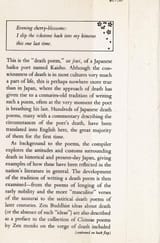Search Results
!!P38zFLDUYUh/x/40632200#40632222
6/30/2025, 5:18:26 PM
>>40632200
The well-known method of suicide of the samurai, seppuku, or harakiri (lit., splitting the stomach), often followed from a commitment to certain elements of Zen philosophy. Judaism, Christianity, and Islam all forbid their followers to kill themselves, suicide being looked upon as rebellion against divine will. Instead of divine will, Buddhism conceived of karma—fate as determined by a man’s own character and past actions. If one’s karma has brought one to the verge of death, what is more natural than to seal one’s present existence—which is no more than a single scene in a many-act play of metamorphoses—with a courageous deed that will insure better karma in the next incarnation? In the eyes of a Zen Buddhist, suicide of this sort may even indicate enlightenment, since one who sets no store by either life or death is likely to be liberated from the karmic cycle of births and deaths.
That many samurai leaders in the Kamakura period leaned toward Zen is reflected clearly in their death poems, some of which are translated below. However, sacrificing one’s life for one’s lord or for the clan is also a Confucian ideal. The individual who dies “appropriately,” according to all the rites and ceremonies, sanctifies the name of the entire group. Thus, even a person who has been a “black sheep” during life is taken back, at death, into the bosom of the “family.” The tendency to surround self-imposed death with a halo of beauty is seen not only with the suicide of samurai, but that of lovers as well. Death by suicide was condoned for those caught in dilemmas from which they could not otherwise extricate themselves. Through death, one could cleanse oneself of misdeeds committed and vindicate the social order that had been violated.
The well-known method of suicide of the samurai, seppuku, or harakiri (lit., splitting the stomach), often followed from a commitment to certain elements of Zen philosophy. Judaism, Christianity, and Islam all forbid their followers to kill themselves, suicide being looked upon as rebellion against divine will. Instead of divine will, Buddhism conceived of karma—fate as determined by a man’s own character and past actions. If one’s karma has brought one to the verge of death, what is more natural than to seal one’s present existence—which is no more than a single scene in a many-act play of metamorphoses—with a courageous deed that will insure better karma in the next incarnation? In the eyes of a Zen Buddhist, suicide of this sort may even indicate enlightenment, since one who sets no store by either life or death is likely to be liberated from the karmic cycle of births and deaths.
That many samurai leaders in the Kamakura period leaned toward Zen is reflected clearly in their death poems, some of which are translated below. However, sacrificing one’s life for one’s lord or for the clan is also a Confucian ideal. The individual who dies “appropriately,” according to all the rites and ceremonies, sanctifies the name of the entire group. Thus, even a person who has been a “black sheep” during life is taken back, at death, into the bosom of the “family.” The tendency to surround self-imposed death with a halo of beauty is seen not only with the suicide of samurai, but that of lovers as well. Death by suicide was condoned for those caught in dilemmas from which they could not otherwise extricate themselves. Through death, one could cleanse oneself of misdeeds committed and vindicate the social order that had been violated.
Page 1
